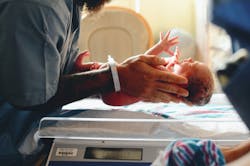Researchers from the University of Edinburgh and University Medical Center Utrecht examined mucosa – tissue that lines the nasal cavity - samples taken from inside the noses of 114 babies at various stages of life as part of the Microbiome Utrecht Infant Study.
The team analyzed the gene activity of the babies’ nasal mucosa, the microbes present in the lining of the nose and any viruses that infected the children.
When a viral infection was detected in the first days after birth, which largely occurred asymptomatically, the team found that specific mucosal genes were activated, coinciding with a change in the composition of the microbiome, promoting the growth of potentially harmful microbes.
The investigators found particular changes in immune system genes in response to early viruses in affected babies, especially in genes involved with interferons - proteins released by immune cells to defend against viruses - over the first year of life.
The interferon-related gene activity, caused by an early first viral infection, is thought to create a pro-inflammatory environment that makes babies susceptible to future infections, experts say.
Respiratory infections are a major health concern. They are responsible for 15 per cent of deaths for children under the age of five globally and are one of the three main causes of doctors’ visits and hospital admittance in the first years of life.
The research has been published in Nature Microbiology. The cohort study, which has been running for six years, was carried out in close collaboration with the Spaarne Hospital, The Netherlands. The work was funded by Scotland’s Chief Scientist Office and the Netherlands Organization for Scientific Research.

